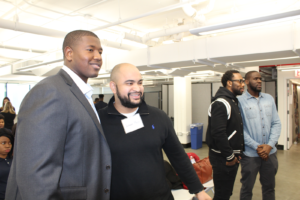NYC Chancellor Struggling to Upend Seniority Clause with City Teachers
It’s not easy. There are many angles to this story that make meaningful change complicated. Even after eliminating the rubber rooms through a deal with the unions, New York City Public Schools Chancellor Joel Klein has to work on several anachronistic clauses in collective bargaining agreements in the city. Among them:
But [Klein] continues to struggle with the union over his desire to lay off so-called absent-teacher reserves, teachers whose positions have been eliminated because of school closings or classroom shifts, but who are entitled to full salaries because they have not done anything wrong.
But the reserves account for only 1,050 teachers, a small percentage of the number that could lose their jobs if proposed state budget cuts are enacted.
So the chancellor has tried to increase parent support for ending seniority by releasing projections showing that layoffs would be disproportionately concentrated in the South Bronx, where many young teachers begin their careers, and the East Side of Manhattan, where a boom in the student population has led to a large number of new teachers.
Families, who pay for New York City public schools with their taxes, would understand that youth, vitality and a long-term mission to aid the development of teachers through the use of technology and federal funding. And the New York Times is helpful in noting that limited studies have been done to account for teacher effectiveness and the measurements that qualify who should be a teacher that stays, and who should be one that goes. On the whole:
Several studies have shown that teachers just beginning their careers are more likely to struggle than more experienced instructors. And a New York Times analysis of the city’s own reports on teacher effectiveness suggest that teachers do best after being in the classroom for at least 5 years, though they tend to level off after 10 years.
“You want to keep a rookie who looks good relative to other rookies, even if it’s not that great relative to all other teachers, because they are going to turn into a really good teacher,” said Douglas O. Staiger, an economics professor at Dartmouth who has worked with the city on teacher quality studies. “The question is: Are our current methods good enough at figuring out who those teachers are? I’m not sure where you draw the line on that.”
But things get interesting.
Limited data on teacher effectiveness in New York City suggests that a purely performance-based system would not favor younger teachers.
In 2008, New York City began evaluating about 11,500 teachers based on how much their students had improved on standardized state exams.
A Times analysis of the first year of results showed that teachers with 6 to 10 years of experience were more likely to perform well, while teachers with 1 or 2 years’ experience were the least likely.
The analysis could not account for differences in the makeup of the 11,500 classrooms, like how many of them had large numbers of students with learning disabilities.
This is the nut, right here. Longitudinal Data Studies are the key to understanding how students are taken through the system, and which teachers helped them most. LDS are part of the four assurances of Race to the Top, but it really doesn’t matter what the federal government is telling states to do. States can put in these systems. It’s up to the people to use them and to understand the right cultural beliefs that make using them effective.
This recent survey by the Data Quality Campaign showed that there are cultural barriers to effective use of LDS. The key policymakers need to be driving effective use of these systems. They are not tick-the-box systems. Once they are in place, you have to be able to manage, assess, use data and then implement solutions backed up solidly by data. It’s not clear that this can happen quickly in New York City.
Everything that runs the New York City Public Schools System is anachronistic. It’s subject to things like assumptions, assurances, gut feelings and anecdotal evidence. In any other industry, people would not go for this. But somehow Teaching is sacred. Sacred to the point that it’s operating like a country that has never heard of radio.







0 Comments
Leave a Comment
Your email address will not be published. All fields are required.